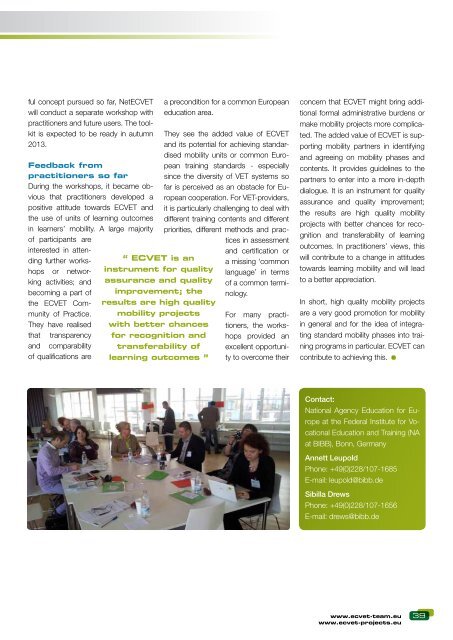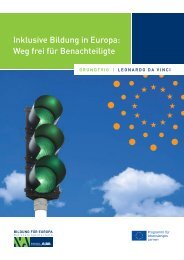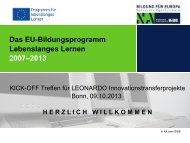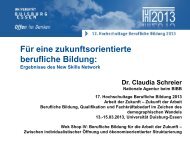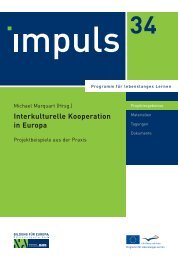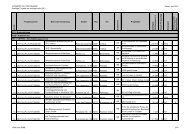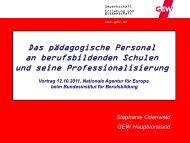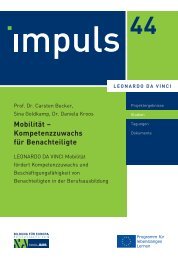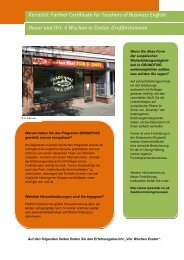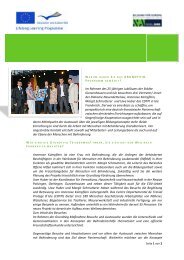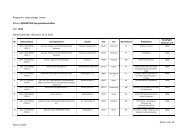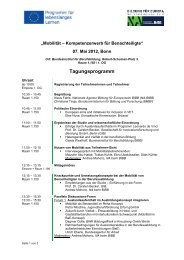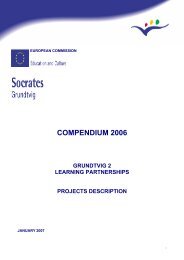Create successful ePaper yourself
Turn your PDF publications into a flip-book with our unique Google optimized e-Paper software.
ful concept pursued so far, NetECVET<br />
will conduct a separate workshop with<br />
practitioners and future users. The toolkit<br />
is expected to be ready in autumn<br />
2013.<br />
Feedback from<br />
practitioners so far<br />
During the workshops, it became obvious<br />
that practitioners developed a<br />
positive attitude towards ECVET and<br />
the use of units of learning outcomes<br />
in learners’ mobility. A large majority<br />
of participants are<br />
interested in attending<br />
further workshops<br />
or networking<br />
activities; and<br />
becoming a part of<br />
the ECVET Community<br />
of Practice.<br />
They have realised<br />
that transparency<br />
and comparability<br />
of qualifications are<br />
“ ECVET is an<br />
instrument for quality<br />
assurance and quality<br />
improvement; the<br />
results are high quality<br />
mobility projects<br />
with better chances<br />
for recognition and<br />
transferability of<br />
learning outcomes ”<br />
a precondition for a common European<br />
education area.<br />
They see the added value of ECVET<br />
and its potential for achieving standardised<br />
mobility units or common European<br />
training standards - especially<br />
since the diversity of VET systems so<br />
far is perceived as an obstacle for European<br />
cooperation. For VET-providers,<br />
it is particularly challenging to deal with<br />
different training contents and different<br />
priorities, different methods and practices<br />
in assessment<br />
and certification or<br />
a missing ‘common<br />
language’ in terms<br />
of a common terminology.<br />
For many practitioners,<br />
the workshops<br />
provided an<br />
excellent opportunity<br />
to overcome their<br />
concern that ECVET might bring additional<br />
formal administrative burdens or<br />
make mobility projects more complicated.<br />
The added value of ECVET is supporting<br />
mobility partners in identifying<br />
and agreeing on mobility phases and<br />
contents. It provides guidelines to the<br />
partners to enter into a more in-depth<br />
dialogue. It is an instrument for quality<br />
assurance and quality improvement;<br />
the results are high quality mobility<br />
projects with better chances for recognition<br />
and transferability of learning<br />
outcomes. In practitioners’ views, this<br />
will contribute to a change in attitudes<br />
towards learning mobility and will lead<br />
to a better appreciation.<br />
In short, high quality mobility projects<br />
are a very good promotion for mobility<br />
in general and for the idea of integrating<br />
standard mobility phases into training<br />
programs in particular. ECVET can<br />
contribute to achieving this.<br />
Contact:<br />
National Agency Education for Europe<br />
at the Federal Institute for Vocational<br />
Education and Training (NA<br />
at BIBB), Bonn, Germany<br />
Annett L<strong>eu</strong>pold<br />
Phone: +49(0)228/107-1685<br />
E-mail: l<strong>eu</strong>pold@bibb.de<br />
Sibilla Drews<br />
Phone: +49(0)228/107-1656<br />
E-mail: drews@bibb.de<br />
<strong>www</strong>.<strong>ecvet</strong>-<strong>team</strong>.<strong>eu</strong> 39<br />
<strong>www</strong>.<strong>ecvet</strong>-projects.<strong>eu</strong>


